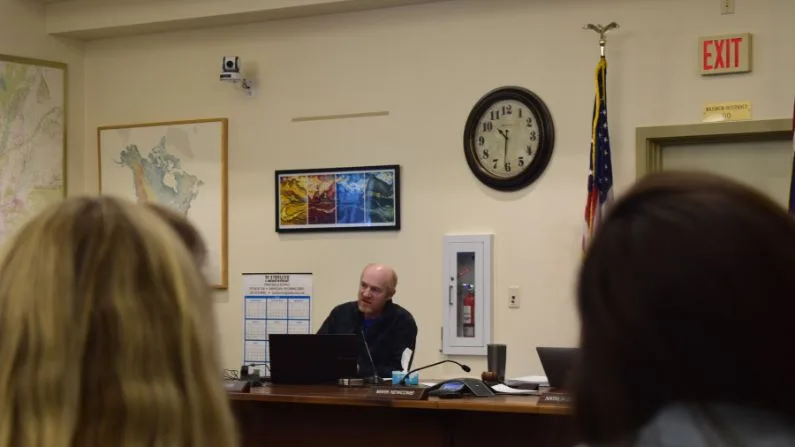Make our newscast part of your daily listening routine. Subscribe on Spotify (or wherever you listen to podcasts).
In a 4-1 vote on Monday, May 19, county commissioners approved a master plan outlining the development of around 600 homes on 101 acres south of town — the majority deed-restricted for local workers.
The Gill’s land in northern South Park is just under half of the total ranch land that the county has allowed for high-density housing, with 70% reserved for local workers. Gill attorney Amberley Baker said shovels could hit the ground within two years, though uncertain.
The Gill’s neighbors, the Lockhart family, will continue ranching for now, having expressed no interest in similar development. Chase Lockhart has been a recent meeting attendee.
Many workers have told commissioners in written and spoken public comment that it’s the last hope for affordable housing in the region.
That includes Rose Caiazzo, who has lived in Teton County with her partner for a combined three decades, urged commissioner support of the master plan at an April meeting.
“We’re ready to be homeowners,” Caiazzo said, “this feels like our chance to finally own a home.”
The commissioners’ vote came after five meetings in just over a month to finalize conditions. It’s the latest step in about five years of proposals from the Gill family. This is the closest to housing the region has come in 30 years of broad discussions eyeing housing for the area.
Luther Propst was the lone “no” vote, consistent with his solo opposition to the project’s first stage approval last March. He said the plan doesn’t adequately address traffic and he has concerns about the amount of land being conveyed to two nonprofits Habitat for Humanity of the Greater Teton Area and the Jackson Hole Community Housing Trust, for deed-restricted homes.
The process has featured several debates over a land donation the Gill family first announced in 2022. Commissioners and members of the public have questioned if the nonprofits can raise the hundreds of millions of dollars to fund 480 deed restricted homes for local workers. Both nonprofits have maintained they can.
At Monday’s meeting, Propst questioned the 45-acre land donation for deed-restricted housing. He worries, given the current plan, the housing could be built on as few as 16 acres because of where development plans place road and school exactions.
“The disconnect between the vision set forth in the neighborhood plan for Northern South Park and the master plan Monday, is remarkable,” Propst said, “it’s a shame for the community.”
Baker and the Gills countered that reduced acreage for deed-restricted homes is out of their control, due to the county’s required setbacks and exactions. Baker said Propst’s take was a “sour grapes” spin on the family’s land donation.
Nikki Gill, part of the landowning Gill family, was flooded with supportive text messages and embraced by members of her team and family after the decision Monday. She views it as a win.
“I’m most excited about the victory that we achieved for the community as a whole,” Gill said, “It’s not just about my family, but it’s about what this project means to so many.”
Her planning team, some housing advocates and even state officials have criticized the public process as onerous.
While a major step forward, this is not the project’s last stop.
Before construction, the landowning Gill family will have to return to county commissioners with specific development plans meeting their nine conditions that, in part, aim to address traffic, open spaces and how quickly area nonprofits build deed-restricted homes.
Commissioners see the conditions as public assurances. At this week’s meeting, Commissioners Luther Propst and Wes Gardner unsuccessfully tried adding more, shot down in part by the county’s attorney, Keith Gingery.
Baker also questioned the legality of the conditions and feels they were “poison pills” meant to derail the project entirely.
Gingery had legal concerns and the three other commissioners were uninterested in fleshing them out. Commissioners can not amend or introduce new land development regulations at this point, he said.
Ultimately, commissioner Gardner voted to approve the master plan, with reservations about the governing land development regulations, which he voted to approve last year.
He said it’s not the county’s place to re-litigate them.
“I am left with the sensation that our LDR’s are inadequate in the face of uncertainty,” he said.
This story has been updated online to correct Rose Caiazzo’s time spent in Teton County with her partner — Ed.






